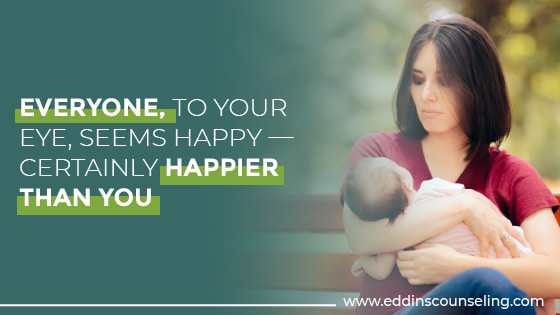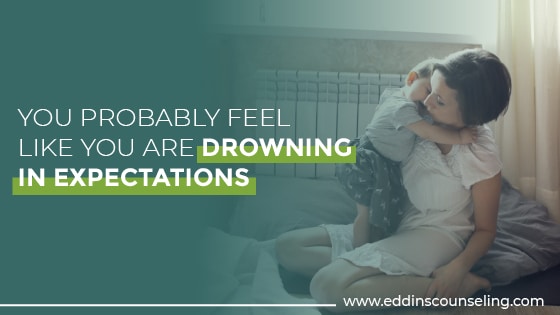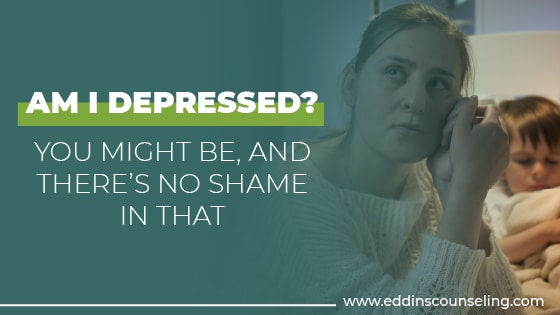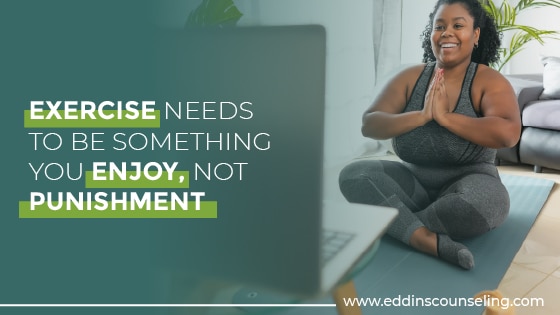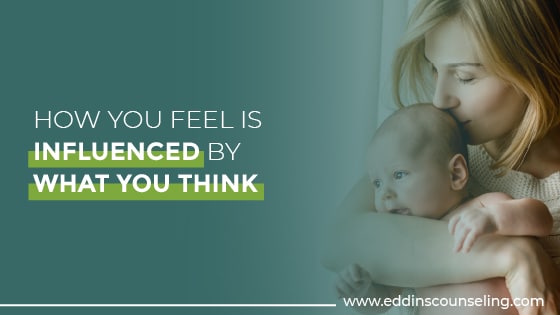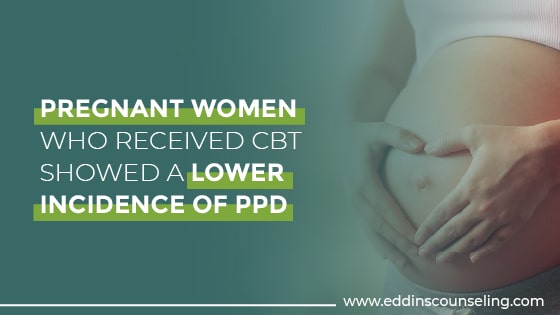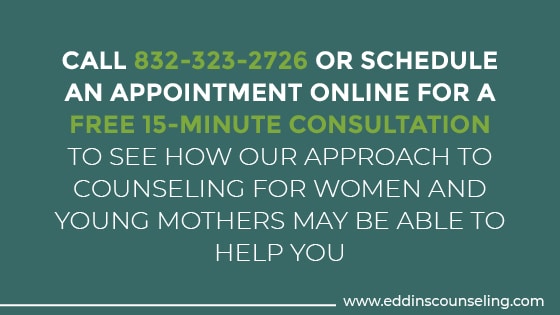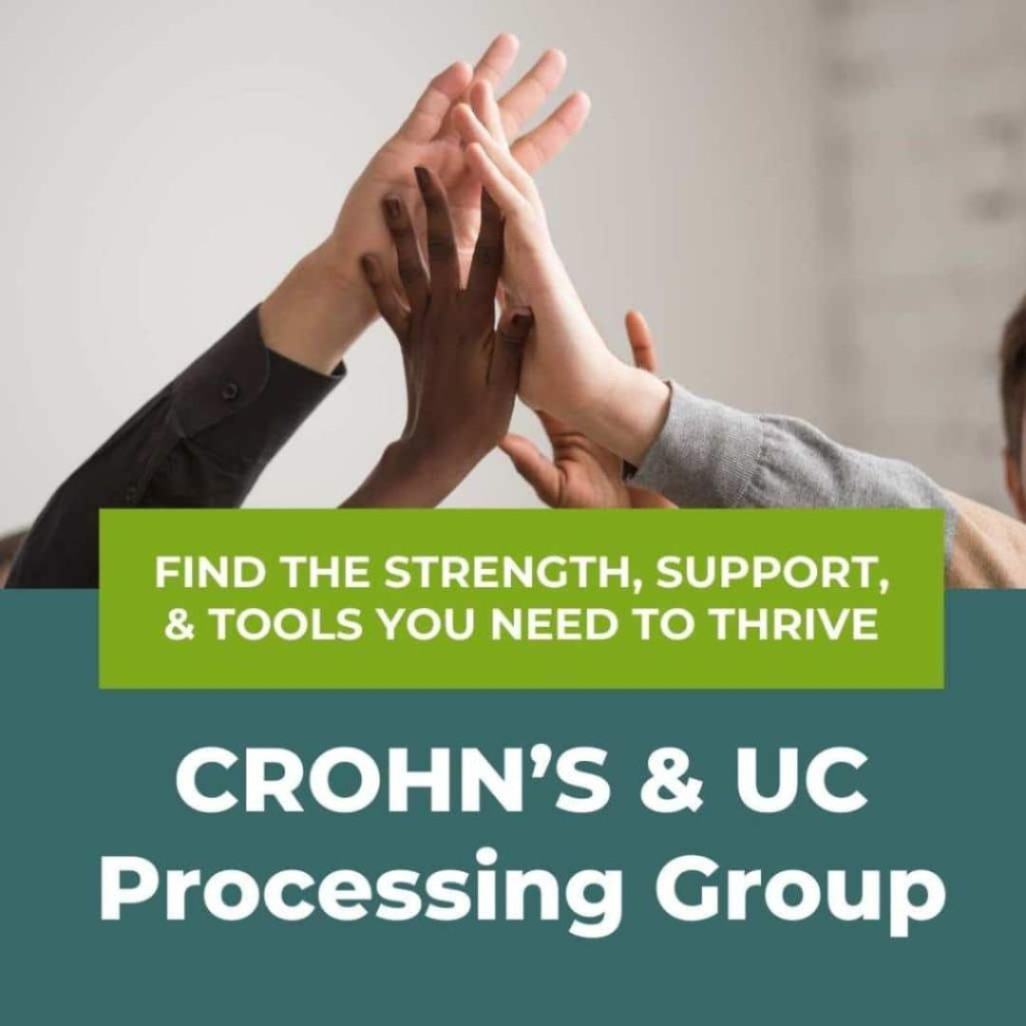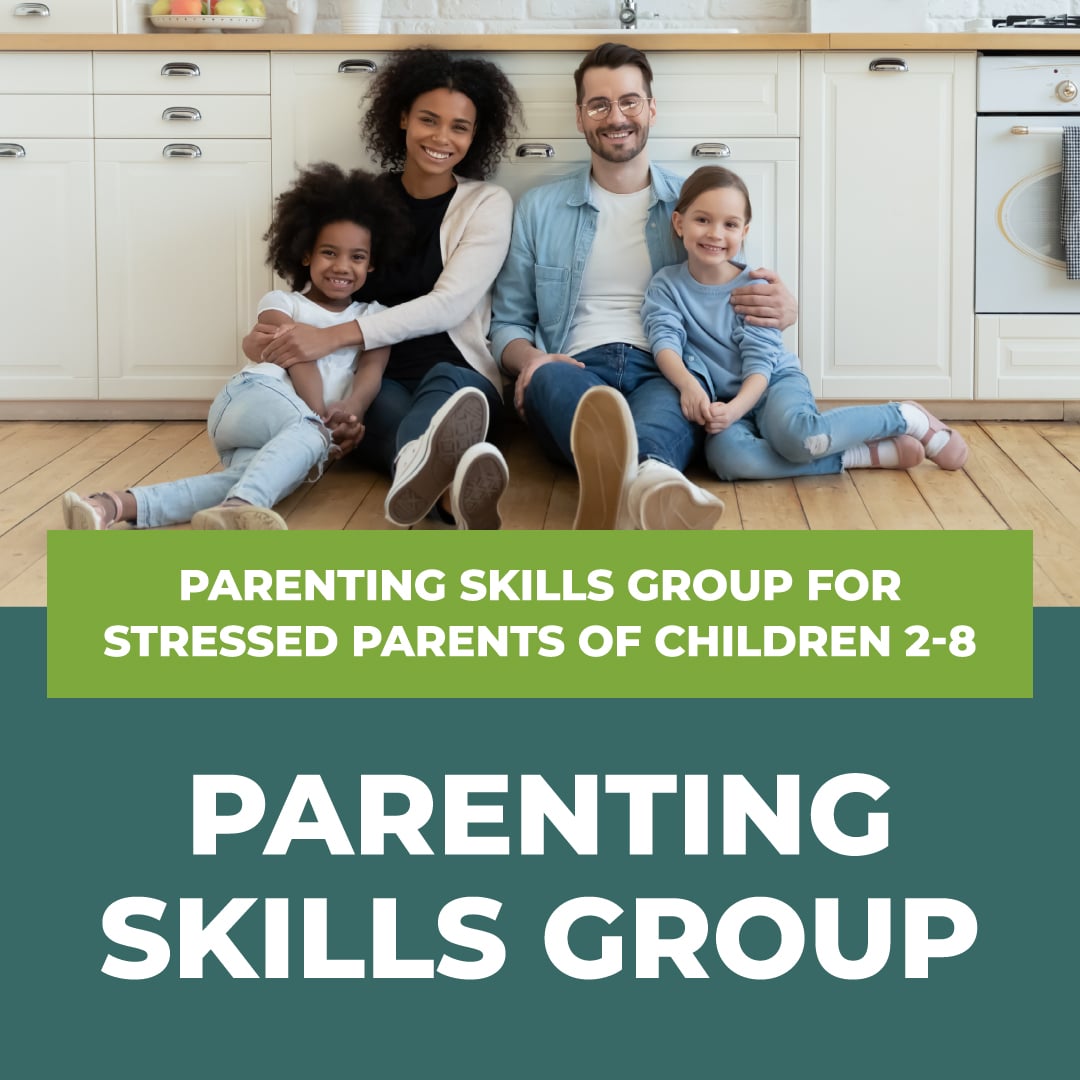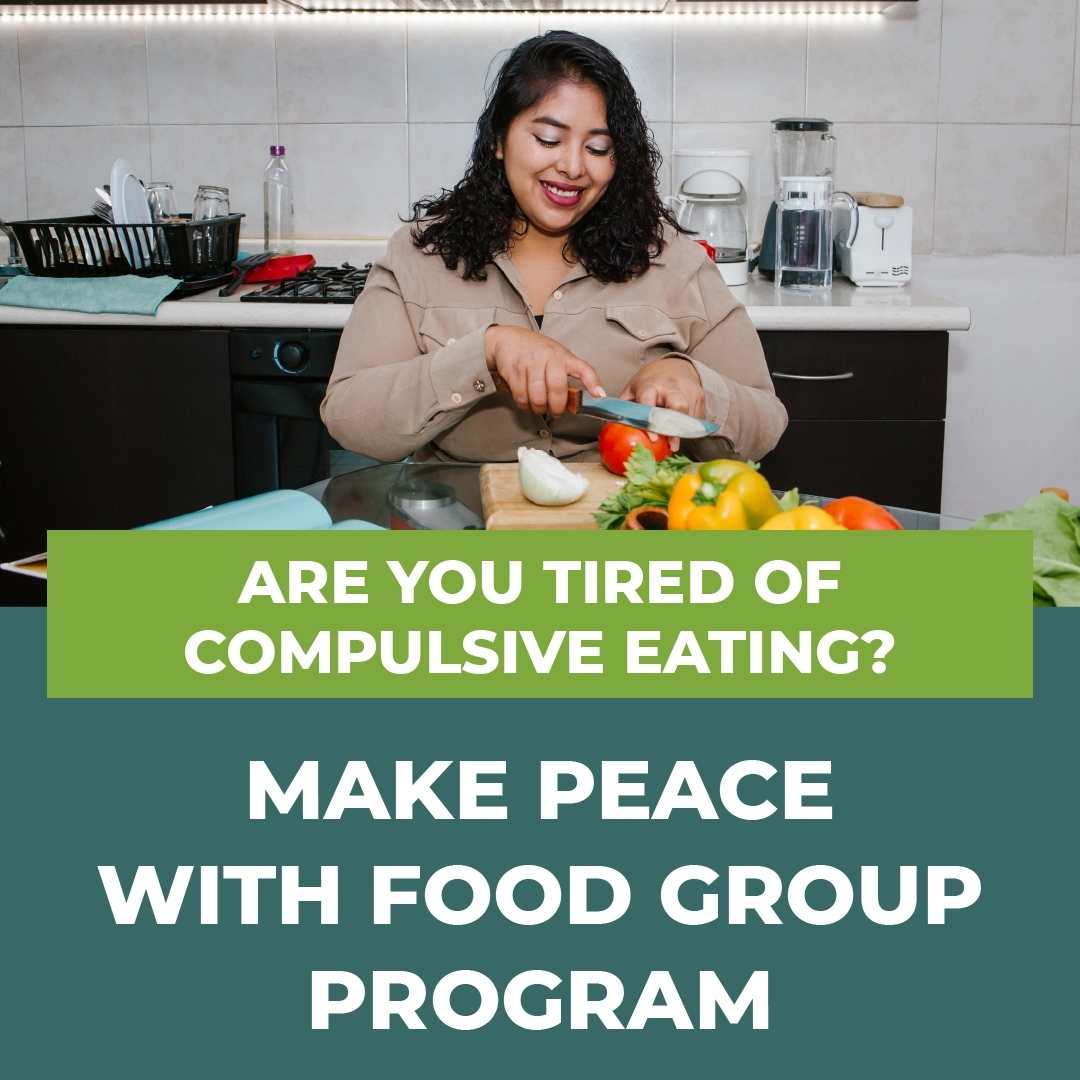September 13, 2021
New Mom, Depression, Perfectionism? Why CBT Works
Written by Sara Lane
Posted in Emotional & Mental Health, Parenting & Family and with tags: cognitive-behavior therapy, motherhood, parenting, postpartum

“Nobody’s perfect.” Everyone knows this, and everyone says it.
You probably have used this simple phrase to soothe and support a lot of people. But you may not be as forgiving when it comes to yourself, especially as a new mom.
All across the internet, you’re bombarded with images and stories of motherhood heaven. They’ve figured it all out.
There also exists the erroneous belief that unless we are perfect moms we’re failing our children. This myth is spurred by the slew of information available about what raising children should look like.
Courtesy of the internet, it has never been easier to find examples of mothers who have that perfectly decorated home and those perfectly dressed children, who are always ahead of their peers, developmentally and intellectually.
But even parenting advice guides and magazines often inspire expectations that most mothers cannot live up to – especially first-time moms.
Inundated by all these painful reminders that you’re falling short and will never be that perfect super mom, it’s no wonder that critical thoughts like “you’re not a good mom” creep into your mind.
This pressure creates stress, and stress is a risk factor for depression.
This is not the motherhood journey you expected
It’s maddening. People tell you— over and over — that you will never be happier. On some level, you know it’s not true. But the perfectionist in you sees it differently.
You believe you’re “supposed” to be glowing with joy and gratitude. And so you wonder:
- “What’s wrong with me?”
- Why then, you may lament, isn’t motherhood turning out as you expected?
- Why do I feel depressed?
Coping with a new baby is hard enough, but we have to address the other elephant in the room. At least one in seven women experiences depression during pregnancy, and at least one in five experiences postpartum depression.
Before you jump to conclusions, this doesn’t mean it’s your fault. You did nothing wrong, but your brain might send you very scary signals that often compound your new reality with guilt.
Self-compassion is crucial now. There is no shame in your experience. You’re human, and you live in a society that can be very unfair to moms, especially new moms.
In this post, we will cover what you are up against as a new mom and different options for overcoming it all.
New Mom vs. Perfectionism
Perfectionism is a form of black and white thinking; it’s either this or that. There is little mental space between success and failure.
So, when a brand new baby enters the picture, failure is simply not an option, which is far more than seeing yourself as “type A.”
Perfectionism can be dangerous. It dovetails with many other mental health issues, e.g.
- Obsessive-compulsive disorder
- Depression
- Eating disorders
- Anxiety
- Thoughts of self-harm and suicide
Here are two of the many ways perfectionism connects with motherhood:
1. Comparisons to Other New Moms Leads to Depression
Social media culture has turned comparisons into pathology. Everyone, to your eye, seems happy — certainly happier than you.
This results in the following equation; perfection equals happiness. Needless to say, since perfection is unattainable, you will never experience joy while on this path.
And society tends to undercut new moms. Your body has undergone an intense transformation due to this incredible act of giving birth you just pulled off.
But to expect you to be able to just get over it and be ready to enter the world as if you didn’t just CREATE life is ridiculous. Things have changed drastically for you in the last 12 months.
Your changes, your baby, and your life have nothing to do with the look of some Instagram model’s tummy or “perfect” little family.
It’s easy to compare yourself to the “supermoms”. They’re perfectly organized, have activities planned for their children all the time, and even home school.
You end up feeling ashamed and defective in comparison. Sometimes you feel so overwhelmed by these comparisons that you withdraw from your own children.
Keep in mind she is probably comparing herself to someone else, and the cycle continues. Let it stop with you.
2. Unrealistic Expectations Put on New Moms
Thanks to false images often altered to look as natural as possible, we have this idea that 50 needs to look like 20, and 20 needs to look like it’s worth a few million.
Despite great efforts, you may think that somebody is always disappointed in you. Rather than giving yourself credit for what you do, your mind is constantly occupied with worries about what you could be doing better.
You obsess about what your children should eat, wear, and achieve.
Either way, you never feel good enough. Even when you accomplish a goal, there’s no time to bask in the glow. You’re too busy worrying about what you did wrong and what’s next on the list.
Thinking like this sets you up for failure even when you don’t fail. The harshness you treat yourself with is not going to make anything better.
It’s just going to make you feel worse or depressed. Not one person out there has a perfect life, not a single one.
No matter how perfect the image or how happy and carefree things seem, it’s not. People don’t give the whole story on social media, so comparing what feels like your worst moments to their best is just unfair.
Excessive Requirements of Happiness
In particular, as a new mom, you may get the idea that unless you’re not happy all the time, you’re not a good mom. You fall into the trap of trying to achieve happiness through perfection.
But because you can’t attain perfection, you lack satisfaction and… happiness. And if you feel like a depressed mom it can create more feelings of inadequacy or failure.
Striving to live up to unrealistic expectations, to the shining examples of others in comparison, and to being happy all the time is not healthy. You only end up becoming overwhelmed and stressing out.
As a result, you begin feeling inferior, worthless, unhappy, and depressed. – Depressed mom is the exact opposite of what you were trying to achieve!
And that starts a vicious cycle. The more you expect of yourself – and it doesn’t work out – the more overwhelmed and depressed you feel.
New Mom Coping with a New Baby
You probably feel like you are drowning in expectations. The things people expect from you are shocking, but it’s hard to step back and see these things for what they are.
You just had a baby, possibly after feeling depressed during pregnancy. Now you are being expected to start building a new life around your baby immediately and look fabulous, start having sex ASAP, and report on how amazing it is to be a new mom.
If sudden, maternal enthusiasm isn’t enough, there are a few catches. Social norms call on you to stay:
- Positive
- Nurturing
- Fit
- Active
- Attractive
- Social
You may also feel pressured to run a household, hold down a job, and present for your partner. “All of those other women posting on social media seem to be pulling all this off,” you may think, “why can’t I?”
Am I Depressed?
You might be, and there’s no shame in that.
Remember, one in seven women experience depression during pregnancy, and as many as one in five women experience postpartum depression. Keep in mind that symptoms of depression can appear up to 12 months after childbirth. This is more than the “baby blues,” — which usually resolve after two or three weeks.
Postpartum depression symptoms include:
- Fatigue and exhaustion
- Sleep disturbances
- Chronic self-criticism and second-guessing
- Bouts of crying
- Relentless worrying, your mind is racing
- Feeling detached from your baby
- Emotions that range from guilt and shame to self-harm and suicide
If any of this resonates with you, below are some ways to ease new mom depression. Don’t go crazy, especially if you have medical complications from birth. We are simply offering ways to shift your mindset.
|
|
11 Ways to Ease New Mom Depression
We’ve worked with new moms with depression and have a couple of tips to ease some of these feelings.
1. Get Some Fresh Air
Sometimes all we need is a bit of perspective, but you might have to go get it. You’re missing out on a lot if you spend every moment of every day indoors.
Getting out in nature or just going outside your front door for some air will revive you and make you feel like you’re part of the world again. If you can, put the baby in a stroller and go out for a walk.
Start small, especially if you are healing. Be kind to yourself. This is supposed to be enjoyment, not punishment.
2. Eat Well
As a busy new mom, you might be skipping meals or grabbing whatever you can quickly eat to get on with your day. In the long run, this will bite you in the butt because eating poorly or too little can make you feel much more rundown.
You can’t pour from an empty cup, and you need food! You would expect anyone else to get through on junk food and scraps, so why should you?
Being undernourished can make a new mom’s depression worse. Keep healthy, nutritious food on hand that you can eat with minimal preparation. Meal prep can be a good start, and you can ask for help with this if it’s a struggle.
3. Get Some “Me Time”
It’s normal for new moms to spend most of their time caring for the baby. But you spend so much time caring for your baby that you are probably not getting much time to yourself.
Enlist your spouse or a friend to watch the baby, so you can spend some time away doing something you enjoy. Whether browsing the bookstore with a coffee or getting a massage, it’s essential to do something for yourself.
Just like with food, you have to fuel yourself.
4. Get Off of Social Media
You don’t have a lot of free time, so don’t waste it on your phone. Use that time to fill yourself up with any other activity you enjoy.
Social media can be aggressive on our feelings after a significant life event. You can document this new stage with images and videos, but you don’t have to share any of it. You can collect those memories simply for your enjoyment.
5. Take a Nap
Sleep deprivation is expected when you have a new baby in the house. As often as you can, let your spouse handle the baby for a bit and take a nap—you’ll almost certainly feel a lot better.
But a lack of sleep contributes to the issues new moms have in a big way.
6. Spend Time with Friends and Loved Ones
Remember how much fun you had with your friends before you had your baby? It’s time to reach out to your friends again.
Spend an afternoon shopping or meet for lunch. Isolation is also common for new moms who may be at home on maternity leave. Fortunately, the antidote is easy.
Spend time with people that fill you up.
|
|
7. Get Some Exercise
Exercise is a cure-all. Not only will it help your body bounce back more quickly from your pregnancy, but it can also help to stabilize your moods due to the release of endorphins.
If you’re having trouble finding time to exercise, consider taking a “mommy and me” exercise class with your baby. And remember, you don’t need to break yourself in half to “bounce back.”
Exercise needs to be something you enjoy, not punishment.
8. Consider Medication
Many new moms think they can’t take medications like antidepressants, especially if they’re breastfeeding. Although you should always check with your doctor, many antidepressant medications are entirely safe while breastfeeding.
9. Start a Mindfulness Practice
Starting your day, or ending it, with a few minutes of mindfulness can be incredibly helpful during any new phase of life. You can look up meditations online or just sit quietly with your breath, feeling your body.
Either way, taking this time each day can have a dramatic impact on our mental health.
10. Be Honest about Your Feelings
Many women feel overwhelmed by the responsibilities of having a new baby or have a hard time adjusting to body image issues. Some new moms find that the reality of parenthood is considerably different than they expected.
There’s a societal attitude that everything about being a mom should be fulfilling—but being unhappy can make you feel even more alone. Be honest about how you’re feeling—just naming your feelings and permitting yourself to feel them can help.
11. Lower your standards.
Parenthood isn’t the same as a job. At work, there are usually clearly defined objectives and paths to success.
Yet, there are no defined rules to go by with parenting. If you want to successfully adapt to the realities of being a mom, you have to learn to lower your standards.
When you stop trying to control yourself and your children, it gives you both the chance to simply be yourselves. It opens the possibility for you to teach your children that to err is human.
Yes, it may seem counter-intuitive, but in order to be a good mom and keep depressed mom blues at bay, you have to accept that you cannot be perfect!
Ironically, once you give up on the idea of doing everything perfectly, you suddenly feel happier. And your children will be happier, too!
How CBT Helps New Moms Overcome Perfectionism
Cognitive-behavioral therapy (CBT) is often the treatment of choice when new mothers want to address their perfectionist tendencies. Are you driving yourself (and others) to distraction with an all-or-nothing approach? CBT just might be a giant step towards recovery and peace of mind.
Put simply, CBT is founded on the basic concept that how you feel is influenced by what you think. We can understand the problem (e.g., perfectionism) by examining how our thoughts and behavior relate to one another.
If you see a social media post about a “perfect” mother, it’s okay to feel some frustration. If that post leads to believing that you are a terrible mother, this is a cognitive distortion.
Your CBT therapist will work with you to address these thoughts. These flawed beliefs inspire certain behaviors, but they can replace the idea with a healthy concept. If so, the behavior will follow.
So, it’s not so much about you “lowering” your standards. There’s nothing inherently wrong with wanting to be a good mother. CBT will help you do so without falling into a vacuum of self-evaluation and self-criticism.
With the help of CBT, a new mother can enjoy such results as:
- Setting realistic goals
- Reducing the need to compare yourself to others
- Not allowing your self-esteem to rise and fall based on one event
- Recognizing the grey area that exists beyond black and white thinking
- Identifying and addressing underlying factors and beliefs
- Trying out exercises that show you how it feels to work under different guidelines
- Developing interests and setting goals in areas that are unrelated to performance
- Alleviating symptoms of depression
How CBT Helps a New Mom Coping With Postpartum Depression (PPD)
But when your cognitive distortions put you into a much darker place, we need to talk about how CBT can help you fight the Postpartum Depression you may be experiencing.
CBT is a research-driven form of psychotherapy designed to eliminate negative thinking and replace such thoughts with more positive self-talk and techniques; this approach is helpful for many new mothers.
Another outcome when applying CBT to PPD is reimagining how to care for your baby and yourself. Using mindfulness and relaxation training, you can develop healthier strategies.
Your child is cared for but not at the expense of your mental health. It’s a reminder that being healthy and happy will translate into better mom skills.
CBT has been road-tested for PPD. In 2015, 40 studies were reviewed. According to the data, CBT reduced PPD symptoms. Pregnant women who received CBT showed a lower incidence of PPD.
Getting the Support You Need and Deserve as a New Mom
Rejecting perfectionism can make you and your child (and your partner) experience your own version of “perfection.” It’s not about winning or being better than someone else that shapes your maternal experience.
It’s about tuning into your unique needs and those of your family. From there, you will behave accordingly and feel fulfilled doing so.
Being a new mom is always a big adjustment. No matter how much you love your baby, having them turns your life upside down.
While some degree of “baby blues” is normal, new mom depression is much more severe. Fortunately, you don’t need to suffer from feeling bad.
New mom depression may be common, but that doesn’t mean it’s something you have to accept. To repeat, depression-like symptoms that linger more than two weeks after giving birth raise a red flag.
Reaching out for help is crucial at that point. An initial option might be a CBT-based support group for mothers.
This empowering environment can provide you with:
- Coping skills
- Peer support as a mother
- Access to resources, strategies, and insights
- A feeling of reconnecting to your authentic self
- Community
You may prefer individual therapy or have had it suggested for you. This option places you in a compassionate and safe space.
You’ll work with your therapist to identify patterns and cultivate new thoughts and behaviors. Most importantly, you are reassured that you are enough.
You are a capable and loving new mother who is asking for support. Your introduction to CBT can and will help you build skills and resiliency for the road ahead.
Let Us Help Guide Your Journey Into Motherhood
Are you struggling with new mom depression? Coping with a new baby and the demands of motherhood needn’t be a lonely journey. We can help and provide solutions. We invite you to call 832-323-2726 or schedule an appointment online for a free 15-minute consultation to see how our approach to counseling for women and young mothers may be able to help you.
Grounding & Self Soothing
Get instant access to your free ebook.
Why You Feel This Way
Get instant access to your free ebook.


